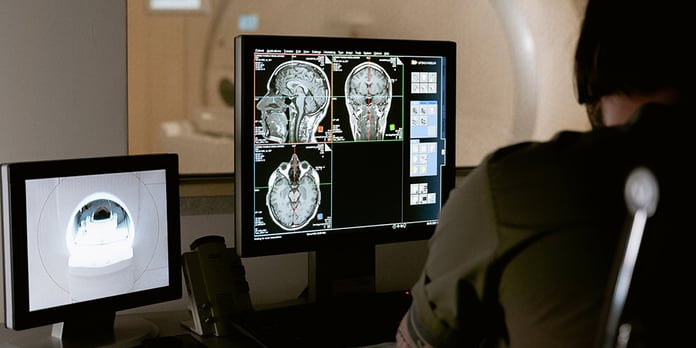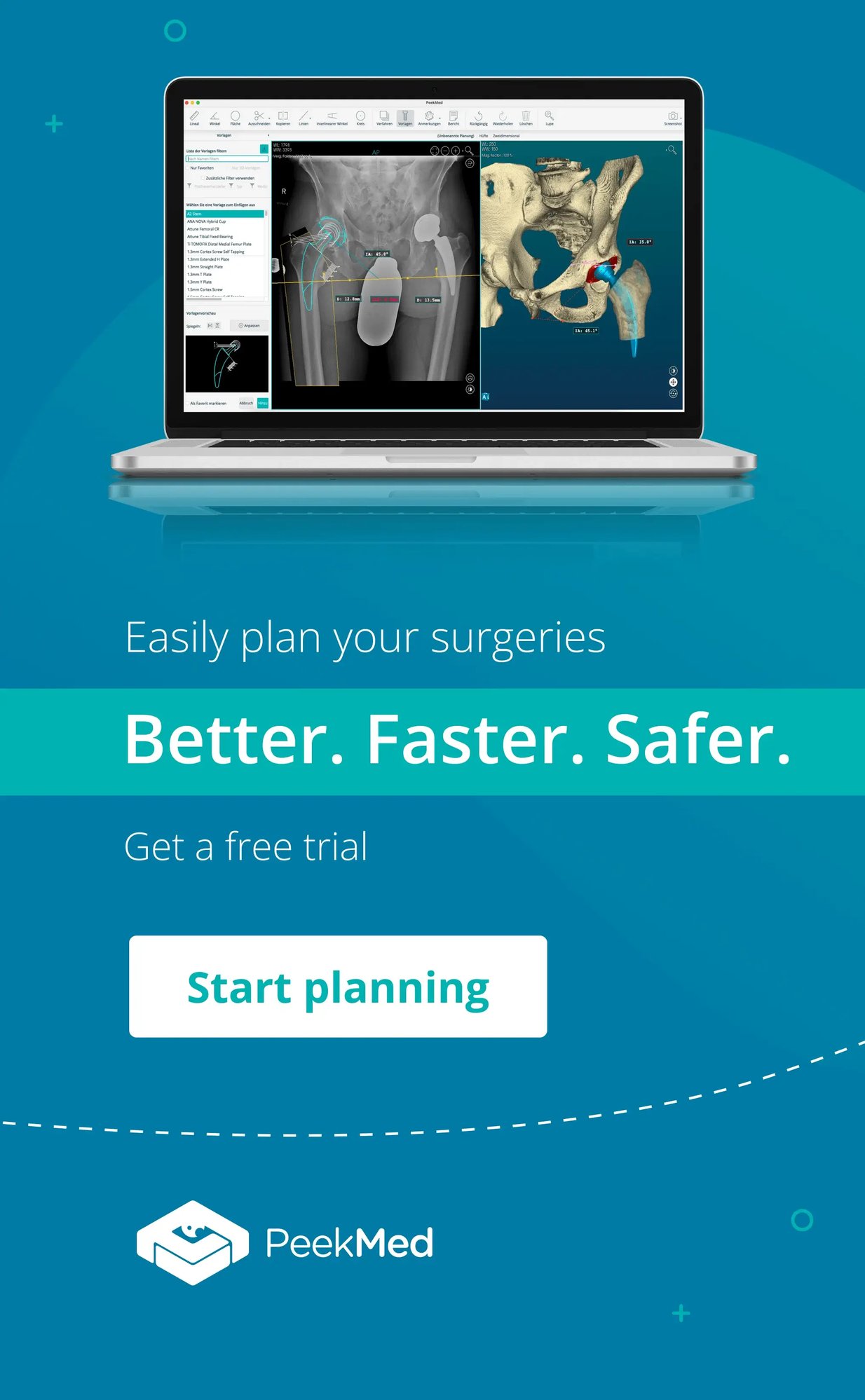PeekMed
Artificial Intelligence (AI) in healthcare, once a concept straight out of a Sci-Fi film, is now a very real part of our daily lives.
In this article, we’re going to be exploring it in detail and especially how Artificial Intelligence (AI) is used in Healthcare.
Table of Contents:
- What is Artificial Intelligence?
- What is Artificial Intelligence in Healthcare?
- Types of Artificial Intelligence
- AI in Healthcare Examples
- Future Trends in Healthcare
What is Artificial Intelligence (AI)?
Just as humans can express natural intelligence, Artificial Intelligence (AI) is intelligence demonstrated by machines – kind of.
The term is frequently used to describe the abilities of computers or computer-controlled robots to perform tasks associated with intelligent beings. AI systems are provided with large amounts of data. Analyzing these and their correlations and patterns, the AI can make predictions.
Artificial Intelligence (AI) in Healthcare has been a trending topic in this context too.
What is Artificial Intelligence (AI) In Healthcare?
AI in Healthcare consists of a collection of technologies that allow computers to comprehend, predict, act, and learn in medical situations.
If you want to be simple about it: AI in healthcare can be used for computers and apps to mimic human cognition, helping with decision-making. Using patient data and combining it with other sources of information, doctors can use AI to deliver more accurate diagnoses and treatment plans.
All of this can be highly personalized, without a one-size-fits-all philosophy – everything in a matter of seconds.
AI is believed to have the capacity to change the scope of medicine, much as the introduction of smartphones changed our day-to-day lives. Artificial Intelligence will make algorithm-only tools become indispensable instruments for patients, providers, and physicians.
But many still wonder what are the advantages of ai in healthcare and how it can be used. Let’s go into a little more detail.

Types of Artificial Intelligence in Healthcare
Machine Learning
Machine learning is one of the most common forms of artificial intelligence in healthcare. It is a broad technique at the core of many approaches to AI and healthcare technology and there are many versions of it.
This technology has the potential to assist healthcare professionals in performing some processes, as it is believed that it can perform just as well or better than humans at certain procedures. Predicting illnesses, aiding in drug development, and lowering costs are some of the examples.
Natural Language Processing (NLP)
Natural language processing (NLP) is a field of deep learning. It aims to create the ability for a computer to understand and analyze human language.
Deep Learning is a class of Machine Learning characterized by the use of neural networks, in which the algorithm learns to distinguish patterns directly from data and learns on its own to select features to classify the input data.
The goal of NLP is to translate the natural human language of a patient’s medical record, for example, surgery reports, into structured format data to query for the presence or absence of a finding.
In Orthopedics specifically, NPL has been applied to identify surgical site infections in free-text notes of medical records and achieved predictive abilities comparable with the manual abstraction process and superior to models that used administrative data only.
AI in Healthcare Examples
AI in Surgery
Artificial Intelligence is changing how we do surgery too.
AI in Surgery not only allows surgeons to establish correlations between large sets of data with little to no effort, but it also applies to more specific – in loco – aspects of surgery.
Using AI in the preoperative phase of surgery is one example. Taking further advantage of medical imaging, surgeons may gain insight into a lot of the information before even entering the OR.
However, Intraoperative and Surgical Robotics can also take further advantage of technology, possibilities are endless.
AI in Preoperative Planning
Pre-operative planning is when surgeons plan the surgical procedure to reduce risks and unexpected scenarios. This strategy not only affects, for the better, patient diagnosis and treatment but also reduces the costs associated with surgeries. This is why Preoperative Planning is important for surgery.
AI has been playing a big role in this field. By bringing together the digital transformation that has been happening in imaging and AI algorithms, surgeons can plan and simulate different outcomes.
This allows them not only to save time but also to have a more in-depth preparation before the surgery day.
AI in Orthopedics
Can Artificial Intelligence help orthopedics surgeons? Yes. By combining surgical skills and tech, orthopedic surgeons can get important insights regarding the possible outcomes of their treatment. By this means, AI in Orthopedics is helping doctors create patient-specific solutions.
This medicine AI solution includes helping surgeons measure bones and defining specific angles and bone quality on a very high level.
%20(1)-Jul-28-2022-09-36-07-98-AM.png?width=597&name=Untitled%20design%20(71)%20(1)-Jul-28-2022-09-36-07-98-AM.png)
Future trends in healthcare: How medical AI is changing the game
Logistics and Sterilization: reduce two costs at the same time
The Public Health crisis caused by the COVID-19 pandemic also had a huge impact on the logistics area and supply chain. This includes surgical material.
Other than reducing drastic costs associated with sterilization, AI can be used as a tool for stock management.
Using AI, surgical wards do not need to overstock for surgeries. By predicting which instruments and implants surgeons will need, hospitals can better manage their resources.
Clinical decision support: Improving patient care
Do not think for a second that AI in medicine only impacts the finances of institutions. After all, we’re talking about healthcare.
Anyone, without a special formation in engineering, can, today, use AI algorithms to enhance a clinical decision for both diagnosis and treatment.
In the case of Orthopedics, it is not uncommon for bone fractures or misalignment to be invisible to the naked human eye. Using big data, AI is now a tool to help doctors identify these.
And by comparing it to other patients' data, helping them make the best decision. A small decision has a big impact on patient care.
WAZE uses AI to tell us which is the best route to follow. The same happens with artificial intelligence in medicine. It helps doctors to choose the right path to follow.

Fight COVID and early diagnosis
In the same line of thought, current trends in healthcare use AI to help diagnose COVID-19.
By combining CT Scans and X-rays with AI, healthcare professionals have been diagnosing COVID-19 infections. Again, by comparing the images with other patients' data, this technology finds patterns to detect the infection within seconds.
In cases where demand outstrips offer, this might be a strategy to follow to keep the healthcare industry in a safe spot.
More time to provide care
We must be able to free our healthcare professionals from routine tasks. And by that, we do not mean getting them an assisting robot.
But there are a lot of tasks that can be performed by AI – such as analyzing data from clinical trials or writing patient data. This will not only speed up the process but, often, enhance the result, too.
Keep in mind that during the pandemic, the lack of human resources was a huge problem for health systems. Not only do you have to deal with huge demand from patients, but you also had staff shortages due to isolation.
So freeing them from these tasks can be a huge advantage for healthcare practice.



